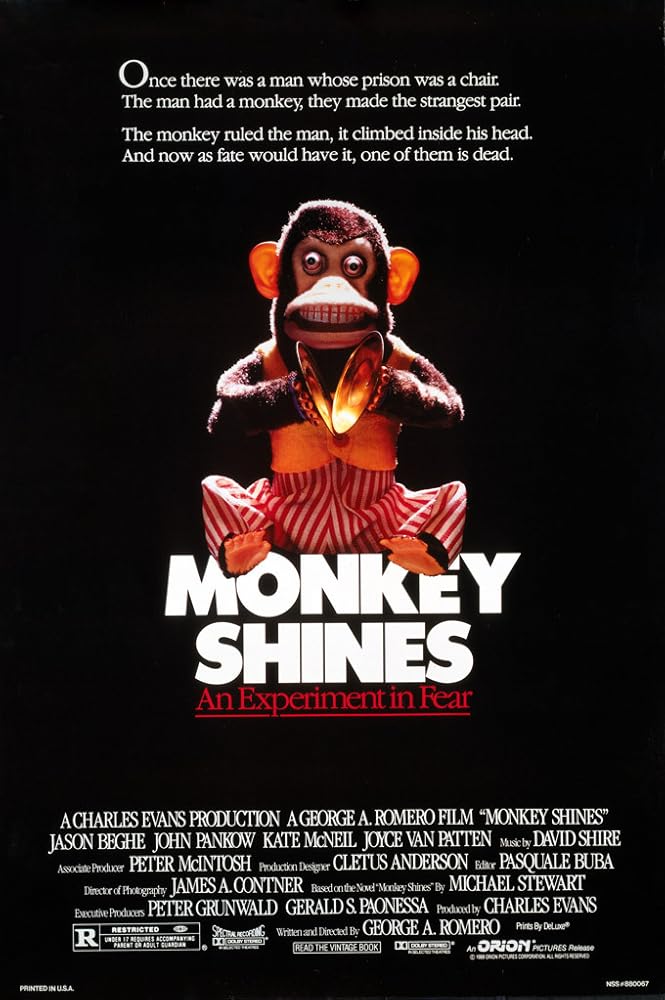
MONKEY SHINES
(director/writer: George A. Romero; screenwriter: based on the book by Michael Stewart; cinematographer: James A. Contner; editor: Pasquale Buba; music: David Shire; cast: Jason Beghe (Allan Mann), John Pankow (Geoffrey Fisher), Kate McNeil (Melanie Parker), Joyce Van Patten (Dorothy Mann), Christine Forrest (Maryanne Hodges), Stephen Root (Dean Burbage), Stanley Tucci (Dr. John Wiseman), Janine Turner (Linda Aikman), William Newman (Doc Williams); Runtime: 113; MPAA Rating: R; producer: Charles Evans; Orion Pictures; 1988)
“A frightening and very effective psychological thriller.”
Reviewed by Dennis Schwartz
A frightening and very effective psychological thriller directed and written by the horror genre’s master, George A. Romero (“Martin”/”Living Dead”trilogy), that goes south mainly due to the cop-out rosy ending forced upon the director by producer Charles Evans. It’s based on the book by Michael Stewart. Though it would be hard to believe its hokey confrontational sequences are anything but the usual cheesy type of horror story shockers, it at least doesn’t resort to special effects alone to tell its emotionally balanced and often gripping B-film story (some might complain that its pace is a bit slow for a horror story, but I think that works to its benefit as it gives us a chance to get to know and sympathize with the psychologically troubled hero in a very real way).
Handsome law student Allan Mann (Jason Beghe) is paralyzed from the neck down after being runover by a truck and now the former star athlete has not only to adjust to being a wheelchair-bound quadriplegic, but that his attractive fiancée Linda (Janine Turner) has dumped him for the smarmy surgeon, Dr. Wiseman (Stanley Tucci ), who saved his life. The embittered best friend of Allan, mad-scientist Geoffrey Fisher (John Pankow), has been using a Capuchin monkey as a research specimen in his lab and has been injecting her with human brain tissue to see if her learning curve will increase, but without mentioning this to anyone decides to have the monkey professionally trained by Melanie Parker (Kate McNeil). She has been providing this monkey helper service for the paralyzed with positive results. After the female monkey is trained, Geoff gives it as a gift to Allan out of both a deep concern for his pal and a selfish desire to continue the unauthorized experiments away from his possessive spying boss (Stephen Root). At first things work out fine as Allan and the monkey, named Ella by the pretty blonde trainer, bond and the frisky monkey does the household chores and turns on Peggy Lee records on the turntable. But the monkey seems to being picking up the repressed bad vibes the suicidal Allan has to all those who have done him wrong and that includes his nasty nurse Maryanne (Christine Forrest), his overbearing mom Dorothy (Joyce Van Patten), his uncaring ex-girlfriend and the smug doctor, who after a second opinion seems not to have done all he could to help his patient.
Things become darker when Allan has nightmarish dreams that he sees things through Ella’s eyes and the monkey responds to those mood swings by tapping into his rage and going ape. Ella starts acting out Allan’s worst animal instincts, as some sort of mind-meld explanation is given for their telepathy. At least that’s how the premise goes until the third act, where we have a baffled Allan stuck in his high-tech wheelchair trying to keep the out-of-control supernatural monkey from attacking mom, Geoff, Melanie and eventually himself. In one daring but hardly fitting scene after another the genetically altered monkey becomes a razor-wielding crazy, a pyromaniac, a bird killer and a killer by electricity. The violence is precipitated further by the love triangle between Melanie, the monkey and Allan, that indicates that there’s competition among the females for the male hero’s love and affection.
Romero does a marvelous job for the most part showing the hero’s honest emotional reactions to his disability (on the negative side there’s the crude characterizations of the supporting cast that seems superficial but, nevertheless, gets over because the fight scenes between the monkey and the heavies are a hoot), showing how very much sexual attitudes influence any relationship and pointing out with extreme examples the obvious dangers of unchecked experiments on animals. That it somehow works, remains provocative, has a likable hero we care about and doesn’t seem all that unreasonable (all things considered), must be credited to the skill Romero brings as a director.
REVIEWED ON 6/25/2006 GRADE: B